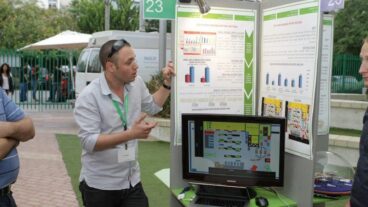
Multiple sclerosis (MS) has devastated the lives of two million people around the world. The disease is more prevalent in cold climates and attacks twice as many women as men. There is currently no cure. Now, research from Israel may pave the way for a diagnosis before symptoms appear and debilitation sets in. Earlier diagnosis of the disease will allow earlier medical intervention – and perhaps even lead to a cure.
Prof. Anat Achiron of Tel Aviv University’s Faculty of Medicine and director of the Multiple Sclerosis Center at Sheba Medical Center has uncovered a new way of detecting MS biomarkers in the blood. Her findings were published in the journal Neurobiology of Disease and are expected to pave the way for a diagnosis of MS before symptoms can appear, allowing for earlier treatment.
MS attacks the central nervous system and eventually renders most patients disabled. The National MS Society estimates that there are currently about 400,000 cases in the US. In Israel there are an estimated 5,000 cases, according to the Israel Multiple Sclerosis Society.
“We are not yet able to treat people with MS to prevent the onset of the disease but knowledge is power,” Achiron says. “Every time we meet a new patient exhibiting symptoms of MS, we must ask ourselves how long this has been going on. We can diagnose MS by brain MRI, but we’ve never been able to know how ‘fresh’ the disease is,” she says.
Identifying MS a decade before symptoms appear
If doctors can predict the onset of MS early enough, intervention therapies using immunomodulatory drugs such as Copaxone (produced by Israel’s Teva Pharmaceuticals) or beta-interferon drugs that stave off MS symptoms might be used.
“We theorized that if we looked at the gene expression signature of blood cells in healthy people, we could look for possible biological markers that characterize those who subsequently developed MS,” Achiron explains.
Examining blood samples of 20 19-year-old Israelis who were inducted into the army as healthy soldiers, and the nine of them who later developed MS, Achiron and her team at Sheba were able to use a “high throughput analysis” with more than 12,000 gene transcripts expressions. The screening compared similarities and differences in the blood of those who developed MS and those who did not, eventually establishing biological markers.
“Those who will develop MS will show a different blood signature from those who will not,” states Achiron. “When we compared the gene expression signatures, we saw a similar pattern of the same working biological processes.”
These early genetic markers may now be used to test for MS up to nine years before healthy young adults start developing symptoms. And because MS is thought to have a genetic component and a tendency to be found in siblings, Achiron foresees that the biomarkers will be used as a tool for brothers and sisters of patients.
Clues for early intervention
Why test in advance of a cure? “The idea is that we’ll know more about the genetics of MS through this new discovery, with the hope that early intervention therapies may be more effective, and help advance medicine toward a cure,” responds Achiron. This new insight into who will develop MS in the future is a first step on the path of finding a cure to the disease.
By the time a person notices symptoms, significant and irreversible nerve damage has already occurred. MS is classified as an autoimmune disease that afflicts the brain and spinal cord. Symptoms vary, because the location and severity of each attack can be different, and until now, there has been no way of knowing who it will strike.
The disease causes the body’s immune system’s T cells to mistakenly regard the myelin sheath around our body’s neurons as foreign, so the immune system starts attacking the sheath, causing neurons to short circuit.
Two of the most important drugs that shorten multiple sclerosis attacks were developed in Israel, and Tel Aviv University is considered a center of excellence in MS research. Other researchers in the study include David Magalashvili and Anna Feldman of Tel Aviv University, and Drs. Itamar Grotto and Ran Balicer of the Israel Defense Forces.












